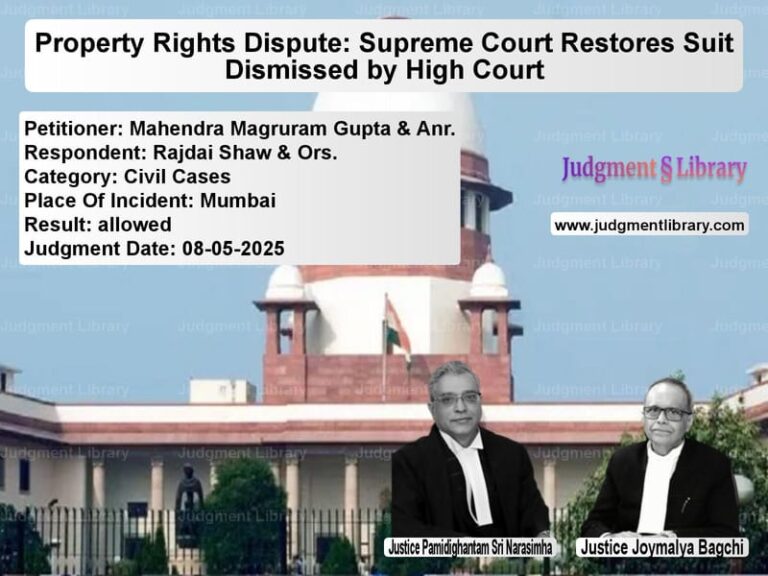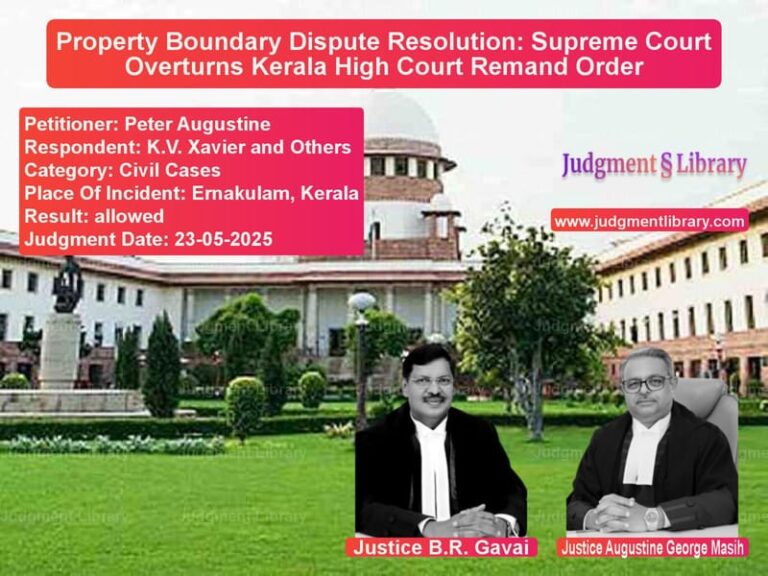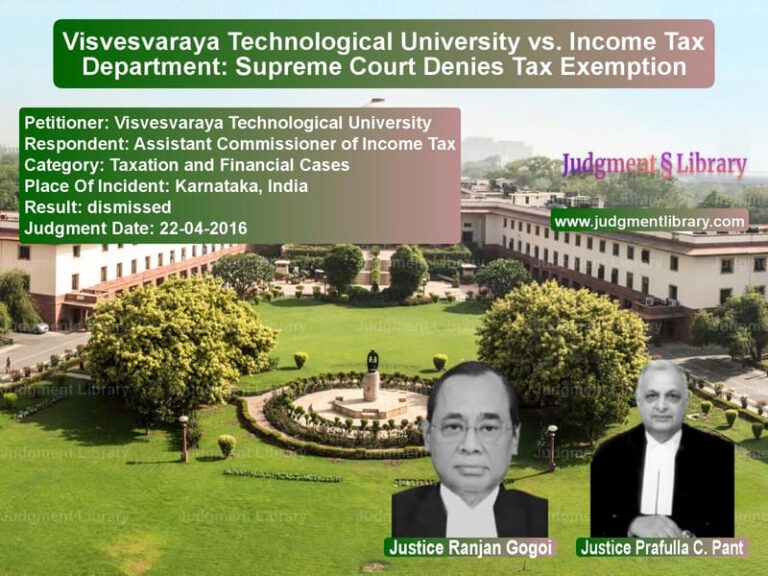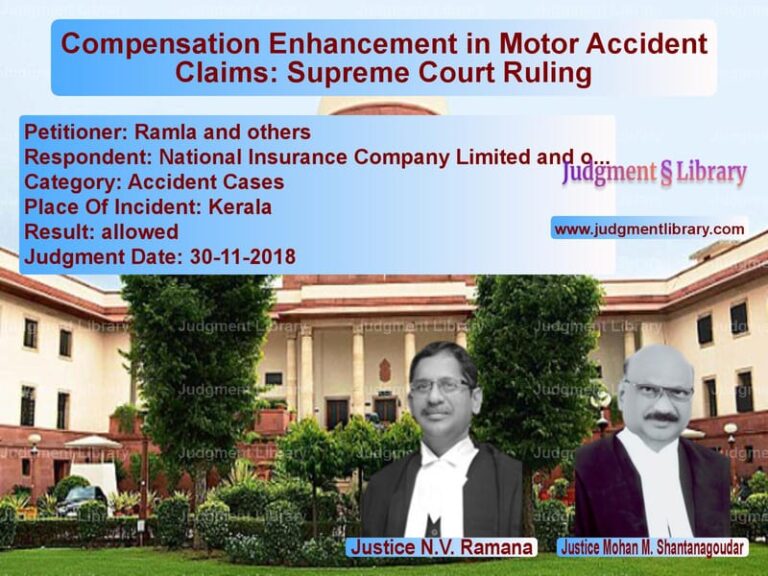Ownership Rights in Land Dispute: Supreme Court Rules Against Private Possession
The case of M.A. Ahuja Dhaba vs. Delhi Development Authority is a significant judgment concerning land ownership disputes, statutory acquisition, and the rights of individuals versus government authorities. The Supreme Court of India, in its judgment dated January 24, 2019, ruled against the appellant, M.A. Ahuja Dhaba, dismissing his claims and reinforcing the principle that mere possession does not confer ownership.
This ruling clarifies the importance of lawful ownership over possession and affirms the validity of land acquisitions made by statutory authorities such as the Delhi Development Authority (DDA). The case is pivotal for property disputes in India and establishes a legal framework for handling cases where individuals claim adverse possession over government-acquired properties.
Background of the Case
The dispute revolves around a piece of land located in Delhi, which was lawfully transferred from the Delhi Improvement Trust to the DDA. The appellant, M.A. Ahuja Dhaba, continued to remain in possession of the land despite the transfer, claiming that he had ownership rights over it.
Key Facts
- The Delhi Improvement Trust had transferred ownership of the disputed land to the DDA under the Delhi Development Act.
- The appellant claimed continued possession of the land and contested the transfer.
- The DDA maintained that the land had been officially acquired by them, and any claims of ownership by the appellant were invalid.
- The High Court ruled in favor of the DDA, dismissing the appellant’s claims.
- The appellant filed an appeal in the Supreme Court, challenging the High Court’s decision.
Legal Proceedings
High Court’s Decision
The Delhi High Court ruled that the appellant had no legal claim over the land as it had been transferred by the Delhi Improvement Trust to the DDA. The Court stated:
“Land acquired by the Delhi Development Authority through a lawful statutory process remains under its ownership, and any private claims of possession without legal documentation are invalid.”
The High Court, therefore, dismissed the appellant’s case and upheld the DDA’s ownership.
Supreme Court’s Observations
The Supreme Court, upon reviewing the appeal, found that the High Court had correctly applied the legal principles governing government-acquired land. The Court held:
“Possession alone does not confer ownership rights. Any person claiming title to the land must establish ownership through legally recognized documents, and the appellant has failed to do so.”
The Court emphasized that statutory land acquisitions by government agencies could not be challenged based on mere physical possession.
Key Legal Issues
Arguments by the Petitioner (M.A. Ahuja Dhaba)
- The petitioner argued that he had been in possession of the land for several decades.
- He claimed that his long-term possession should be recognized as ownership.
- The petitioner contended that the DDA had not legally acquired the land and that his rights were being arbitrarily denied.
Arguments by the Respondent (Delhi Development Authority)
- The DDA asserted that the land was lawfully transferred to them by the Delhi Improvement Trust.
- The authority argued that possession alone does not create ownership rights.
- The DDA stated that the appellant’s claims were invalid as he had no legal documentation proving ownership.
Supreme Court’s Final Judgment
The Supreme Court upheld the High Court’s decision and dismissed the appeal. The key directives were:
- The appellant had no legal ownership over the land.
- The DDA’s statutory ownership could not be questioned based on mere physical possession.
- The dismissal of the appeal did not prevent the appellant from seeking other legal remedies if available under the law.
The Court concluded:
“Considering the statutory provisions and legal framework, we find no reason to interfere with the High Court’s decision. The appeal is dismissed.”
Legal Precedents Considered
The Supreme Court referred to several key precedents while delivering its judgment:
- State of Haryana vs. Mukesh Kumar (2011) – Established that adverse possession must be proved through uninterrupted and peaceful possession.
- Union of India vs. Shiv Raj (2014) – Held that statutory acquisitions are binding unless legally challenged in a timely manner.
- Delhi Development Authority vs. Mahavir (2004) – Clarified that government agencies have lawful rights over acquired land.
Conclusion
The Supreme Court’s judgment in M.A. Ahuja Dhaba vs. Delhi Development Authority establishes an important legal principle regarding land ownership. It reinforces that:
- Long-term possession does not automatically confer ownership.
- Land acquired by statutory authorities remains under their control unless lawfully challenged.
- Government acquisitions must be respected, and unauthorized possession cannot override legal ownership.
This ruling sets a strong precedent for similar land disputes and ensures that lawful acquisitions by government agencies cannot be challenged based on informal claims of possession.
Petitioner Name: M.A. Ahuja Dhaba.Respondent Name: Delhi Development Authority.Judgment By: Justice R. Banumathi, Justice R. Subhash Reddy.Place Of Incident: Delhi.Judgment Date: 24-01-2019.
Don’t miss out on the full details! Download the complete judgment in PDF format below and gain valuable insights instantly!
Download Judgment: M.A. Ahuja Dhaba vs Delhi Development Au Supreme Court of India Judgment Dated 24-01-2019.pdf
See all petitions in Property Disputes
See all petitions in Landlord-Tenant Disputes
See all petitions in Judgment by R. Banumathi
See all petitions in Judgment by R. Subhash Reddy
See all petitions in dismissed
See all petitions in supreme court of India judgments January 2019
See all petitions in 2019 judgments
See all posts in Civil Cases Category
See all allowed petitions in Civil Cases Category
See all Dismissed petitions in Civil Cases Category
See all partially allowed petitions in Civil Cases Category







